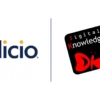Indicio recently released its European Central Cloud Scale Mediator to provide better latency and service to local users. Here’s what you need to know to build an effective decentralized identity solution in Europe.
By Tim Spring
Faster mediation, happier customers
Indicio recently unveiled its dedicated European cloud scale mediator. Now, customers across Europe have access to better latency and faster service when sending messages through a decentralized network.
For those not familiar, a mediator plays a key role in delivering messages in a decentralized network. You can think of it almost like a post office: the mediator receives messages and can find and deliver them to the correct recipient.
This is important because in a decentralized network there is no direct connection between you and the party you are trying to communicate with. Having a faster mediator allows a decentralized identity solution to process more messages and provide a better experience to the end user.
The European Cloud Scale Mediator is part of Indicio’s commitment to helping customers in Europe build powerful and fast identity solutions. Interest in the technology has been growing as the European Union looks to allow for easier travel and better identity management for its citizens.
European Identity Standards
If you are looking to build identity technology or processes in Europe, there are a number of regulations and standards to keep in mind. The two that are most important are the “electronic Identification, Authentication and Trust Services” (eIDAS) and OpenID Standards. If you’re not familiar with them, here’s a quick overview.
The goal of eIDAS Regulation is to ensure that electronic interactions are safer, faster and more efficient, regardless of the European country in which they take place. The net result of the regulations is a single framework for electronic identification (eID) and trust services, making it more straightforward to deliver services across the European Union.
eIDAS2 (New!)
eIDAS was a good start, but as the technology has evolved, the European Union has recognized some issues and problems that the original regulations didn’t address. Namely, eIDAS does not cover how certificates or professional qualifications are issued and used (for example medical or attorney licenses), making these electronic credentials complicated to implement and use across Europe. More worryingly for the individual, it does not allow the end user to control the data exchanged during the verification process.
eIDAS2 proposes creating a European digital identity that can be controlled by citizens through a European Digital Identity Wallet (EDIW) that anyone can read to verify the identity of citizens.
The OpenID Foundation was created to “lead the global community in creating identity standards that are secure, interoperable, and privacy-preserving.” This group is a non-profit standards body that you don’t technically need to be compliant with, but building along their guidelines will add interoperability to your project and allow more people to make use of it easier.
The OpenID Foundation also provides some specifications specifically for verifiable credentials and their issuance, presentation and how they are stored. You can learn more at the above link.
Indicio makes building easy
Indicio offers a full package of support to our European customers. Not only do we have all the pieces to help you put together the decentralized identity solution to best meet your needs, we make it our priority to offer solutions that are universal in accommodating current and emerging protocols and standards.
To learn more about the European Cloud Scale Mediator or discuss a decentralized identity project that you have in mind please get in touch with our team here.
####






